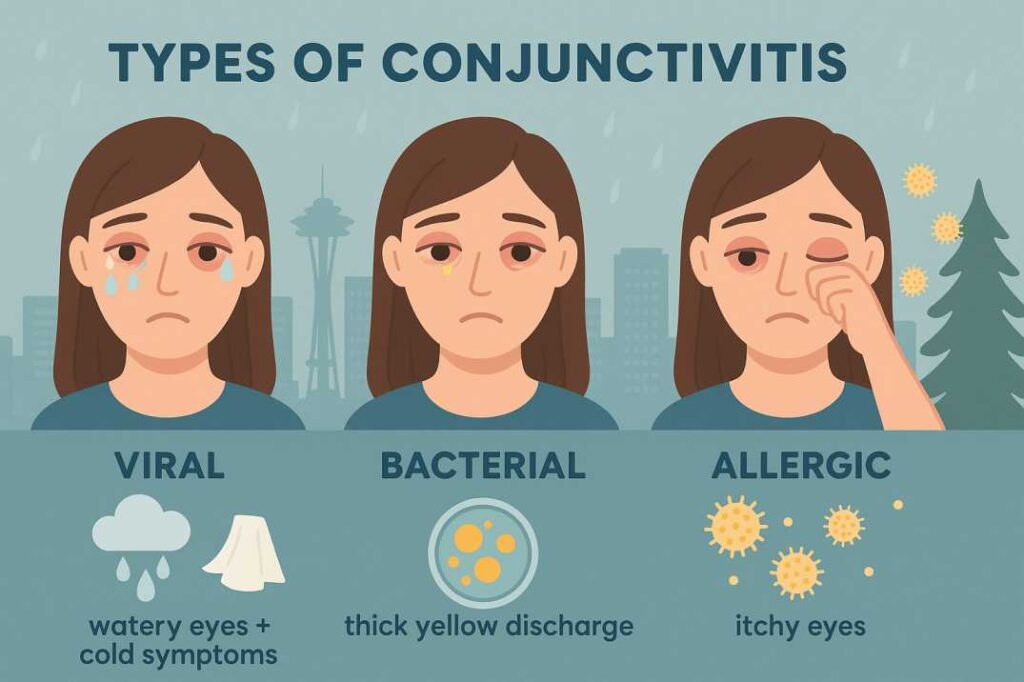Conjunctivitis
Pink eye, medically known as conjunctivitis, affects millions of Americans annually. If you’re experiencing red, itchy, or watery eyes in Seattle, you’re not alone. The Pacific Northwest’s unique climate—from spring pollen to winter dryness—creates specific challenges for eye health that locals need to understand.
At Cannon EyeCare, we’ve treated thousands of conjunctivitis cases across the Seattle metropolitan area. This comprehensive guide answers the most common questions we hear from patients daily, backed by the latest medical research and tailored specifically for Seattle residents.
Conjunctivitis (pink eye) is inflammation of the conjunctiva—your eye’s protective membrane covering the whites and inner eyelids. This irritation causes the telltale pink/red appearance. Though alarming, most cases resolve with proper care.
Seattle-specific insights:
-
Viral conjunctivitis: Peaks during Seattle’s flu season
-
Bacterial conjunctivitis: Often follows colds/upper respiratory infections
-
Allergic conjunctivitis: Triggered by our extended pollen seasons (Feb-Oct)
Why Seattle’s climate heightens risk:
-
Record-long pollen seasons with distinct peaks:
• Tree pollen: March-May
• Grass pollen: May-July
• Weed pollen: August-October -
Winter’s low humidity + indoor heating worsens dry eyes, increasing irritation susceptibility. Seek Seattle-specific pink eye treatment if symptoms persist.
Types of Conjunctivitis: Identifying Your Condition in Seattle
Accurate identification ensures proper treatment. Each type has distinct causes, symptoms, and therapies:
Viral Conjunctivitis
Symptoms:
-
Watery discharge (not thick/yellow)
-
Typically affects both eyes within 24-48 hours
-
Accompanied by cold symptoms (sore throat, runny nose)
-
Mild-moderate discomfort
Key Facts:
✓ Lasts 1-3 weeks untreated
✓ Highly contagious (7-14 days)
⚠️ COVID-19 Connection: 2025 research shows survivors face 3.5x higher risk of new-onset conjunctivitis. Persistent irritation post-COVID warrants an ophthalmologist in Seattle.
Bacterial Conjunctivitis
Symptoms:
-
Thick yellow-green discharge
-
Eyes “glued shut” upon waking
-
Often starts in one eye
-
Severe discomfort
Key Facts:
✓ Improves in 2-5 days with antibiotics
✓ Contagious until 24-48 hours post-treatment
⚠️ Antibiotic Alert: 2024 studies identify drug-resistant Staphylococcus aureus strains—professional diagnosis ensures effective treatment.
Allergic Conjunctivitis
Symptoms:
-
Intense itching (key indicator)
-
Clear, stringy mucus
-
Always affects both eyes
-
Matches Seattle’s pollen seasons
Seattle-Specific Triggers: -
Spring: Alder, birch, oak pollen
-
Summer: Grass pollen, mold spores
-
Fall: Ragweed, English plantain
-
Year-Round: Dust mites, pet dander
Recognizing Pink Eye Symptoms: When Seattle Residents Should Seek Care
Early detection prevents complications and limits spread. Monitor these key symptoms:
Common Mild-Moderate Symptoms
-
Eye redness or pink discoloration
-
Watery or thick discharge
-
Itching, burning, or grittiness (feeling of debris in the eye)
-
Excessive tearing
-
Mild light sensitivity
Severe Symptoms Requiring Urgent Care
Visit an eye care clinic immediately if experiencing:
-
Severe eye pain (beyond mild discomfort)
-
Significant vision changes or blurriness
-
Extreme light sensitivity
-
High fever accompanying eye issues
-
Green/yellow discharge with vision impairment
-
No improvement after 3-5 days of treatment
Critical Red Flags for Seattle Parents
Children’s symptoms can escalate rapidly. Contact Cannon EyeCare in Seattle promptly if your child has:
-
Refusal to open eyes due to pain
-
Fever exceeding 101°F with eye symptoms
-
Noticeable swelling around the eyes
-
No improvement within 24 hours of starting antibiotic treatment
How Contagious Is Pink Eye? Seattle-Specific Work & School Guidelines
Understanding transmission periods helps protect our community while maintaining daily routines:
Contagious Periods by Type
Viral Conjunctivitis:
-
Peak contagiousness: First 3-5 days
-
Total transmission window: 7-14 days
-
Return to Seattle schools/work: When eye discharge fully resolves
Bacterial Conjunctivitis:
-
Highly contagious until antibiotic treatment begins
-
Safe return: 24-48 hours after starting antibiotics
-
Key indicator: Significant reduction in discharge
-
Not contagious at any stage
-
Safe for immediate school/work attendance
-
Focus on allergy management
Seattle School District Policies
Aligned with Washington State Department of Health standards:
-
Students may return 24 hours after initiating antibiotics (bacterial cases)
-
Fever-free for 24 hours without medication
-
Demonstrated ability to participate normally
Recommendation: Confirm policies with your school nurse before returning
Adult Workplace Guidance for Seattle Professionals
-
Utilize remote work options during contagious phases
-
Avoid shared spaces (offices, break rooms) until symptoms clear
-
Implement strict hygiene protocols upon return (especially in healthcare/tech sectors)
Home Remedies and Self-Care: Safe Strategies for Seattle Residents
Effective home care accelerates recovery while preventing complications. Follow these evidence-based approaches:
Safe Home Treatments
Cold Compresses:
-
Soak a clean washcloth in cold water
-
Apply for 10-15 minutes per session
-
Use separate cloths for each eye
-
Repeat 3-4 times daily
Eyelid Hygiene:
-
Wash your hands thoroughly before eye contact
-
Gently wipe discharge with a warm, damp cloth
-
Always move from the inner to the outer corner
-
Discard the cloth immediately after use
Artificial Tears:
-
Select preservative-free formulations
-
Apply 1-2 drops every 2-4 hours
-
Refrigerate for enhanced soothing effect
Remedies to Avoid
Potentially Harmful Practices:
-
Raw honey (risk of bacterial contamination)
-
Breast milk (unproven efficacy, safety concerns)
-
Tea bags (possible contamination)
-
Sharing eye medications between family members
Seattle-Specific Self-Care
Humidity Management:
-
Use humidifiers during Seattle’s dry winters
-
Maintain indoor humidity at 30-50%
-
Saltwater nasal rinses during pollen season (Feb-Oct)
Prevention Strategies: Reducing Pink Eye Risk in Seattle’s Allergy Environment
Proactive prevention is essential in Seattle’s high-allergy setting. Implement these evidence-based habits:
Daily Prevention Practices
Hand Hygiene:
-
Wash your hands for 20 seconds with soap
-
Use alcohol-based sanitizer when unavailable
-
Avoid touching your eyes with unwashed hands
Environmental Controls:
-
Replace HVAC filters monthly during pollen season
-
Keep windows closed during high-pollen days
-
Shower after outdoor activities to remove allergens
-
Adhere to replacement schedules
-
Use fresh solution daily (never reuse)
-
Remove immediately if irritation occurs
Seasonal Seattle Strategies
Spring (March-May):
-
Begin allergy medications preemptively
-
Track local pollen forecasts
-
Consider prescription allergy drops for severe cases
Summer (June-August):
-
Schedule outdoor activities for early morning/evening
-
Wear protective wraparound sunglasses
-
Drive with windows closed using AC
Fall (September-November):
-
Monitor rising weed pollen counts
-
Reinforce hand hygiene during school outbreaks
-
Continue HVAC filter replacements
When to Seek Professional Care at Cannon EyeCare in Seattle
Timely intervention prevents complications and ensures precise treatment. Follow these guidelines:
Seek Emergency Care For:
-
Sudden severe eye pain
-
Significant vision loss or distortion
-
Light sensitivity is preventing eye opening
-
Eye injuries with conjunctivitis symptoms
Schedule Within 24 Hours For:
-
Thick green/yellow discharge with vision impairment
-
No improvement after 72 hours of treatment
-
Worsening symptoms despite self-care
-
Recurrent episodes (post-COVID cases require prompt evaluation)
Book Routine Appointments For:
-
Mild symptoms requiring treatment guidance
-
Preventive care during Seattle’s allergy season
-
Contact lens-related irritation
-
School/work clearance documentation
Your Visit Experience at Our Seattle Clinic
Expect:
-
Detailed symptom/trigger analysis
-
Comprehensive exam using diagnostic technology
-
Lab testing for persistent cases
-
Personalized treatment plan for Seattle’s environment
-
Follow-up scheduling to ensure recovery
Special Considerations for Seattle Families Managing Conjunctivitis
Families face unique challenges in our region’s allergy-prone environment. Key guidance:
Managing Pediatric Pink Eye in Seattle
Age-Specific Protocols:
-
Infants (0-12 months): Require urgent evaluation at Cannon EyeCare
-
Toddlers (1-3 years): Prioritize comfort and containment (avoid daycare spread)
-
School-age (4-18): Balance treatment with Seattle school policies
Symptom Relief Strategies:
-
Cool, damp washcloth applications
-
Age-appropriate acetaminophen for discomfort
-
Calming activities during eye drop administration
-
Increased rest and hydration
Pregnancy-Safe Conjunctivitis Care
Approved Treatments:
-
All artificial tear formulations
-
Cold compresses
-
Gentle eyelid hygiene
-
Most topical antibiotics (OB-approved)
Avoid During Pregnancy:
-
Tetracycline/fluoroquinolone-class oral antibiotics
-
Steroid eye drops without an ophthalmologist’s supervision
-
Unregulated herbal remedies
Cost & Insurance Considerations for Pink Eye Treatment in Seattle
Financial planning reduces stress during eye health concerns:
Typical Treatment Costs at Seattle Clinics
Office Visits:
-
Initial consultation: $150-$250
-
Follow-up appointments: $75-$150
-
Emergency evaluation: $200-$350
Medication Expenses:
-
Generic antibiotic drops: $15-$30
-
Brand-name antihistamines (e.g., Pataday): $25-$60
-
Prescription artificial tears: $10-$25
Seattle Insurance Coverage Overview
Most regional providers cover:
- Medically necessary office visits
- Prescription medications for bacterial cases
- Complication-related follow-up care
Common Exclusions:
-
Over-the-counter remedies
-
Preventive allergy treatments
-
Comfort measures (cool compresses, non-Rx tears)
Cost-Saving Tips for Seattle Families
-
Verify in-network status with Cannon EyeCare
-
Ask about generic medication alternatives
-
Utilize HSA/FSA funds for eligible expenses
-
Discuss payment plans for uninsured care
Don’t let conjunctivitis disrupt your life. With proper knowledge, prevention strategies, and professional support when needed, you can keep your eyes healthy and comfortable through every Seattle season.
Ready to take control of your eye health? Contact Cannon EyeCare today for expert conjunctivitis care tailored to Seattle’s unique environment.
FAQs
-
Viral conjunctivitis typically resolves in 7-14 days without treatment. Bacterial conjunctivitis improves in 2-5 days with antibiotics, but may persist longer without proper treatment.



